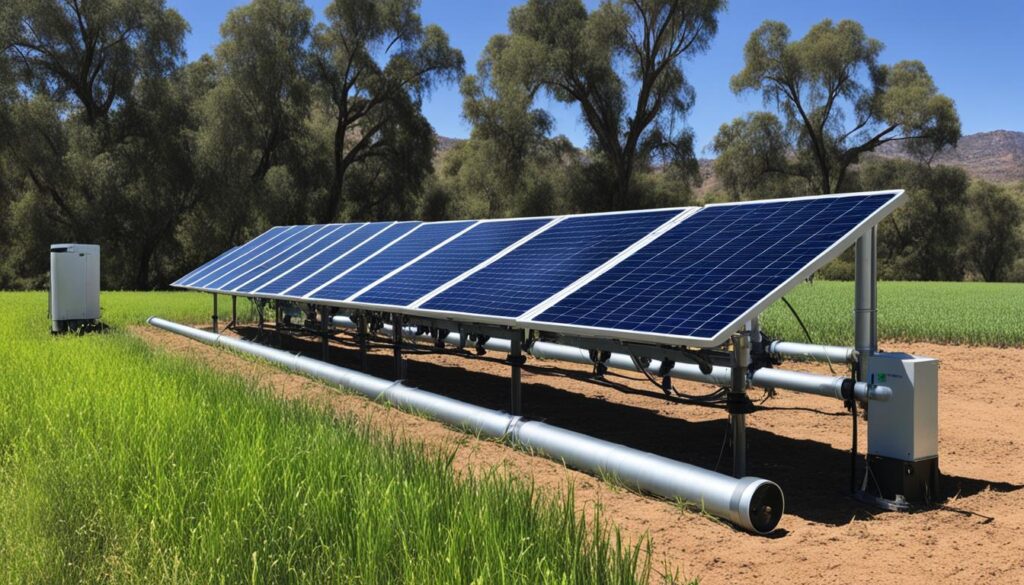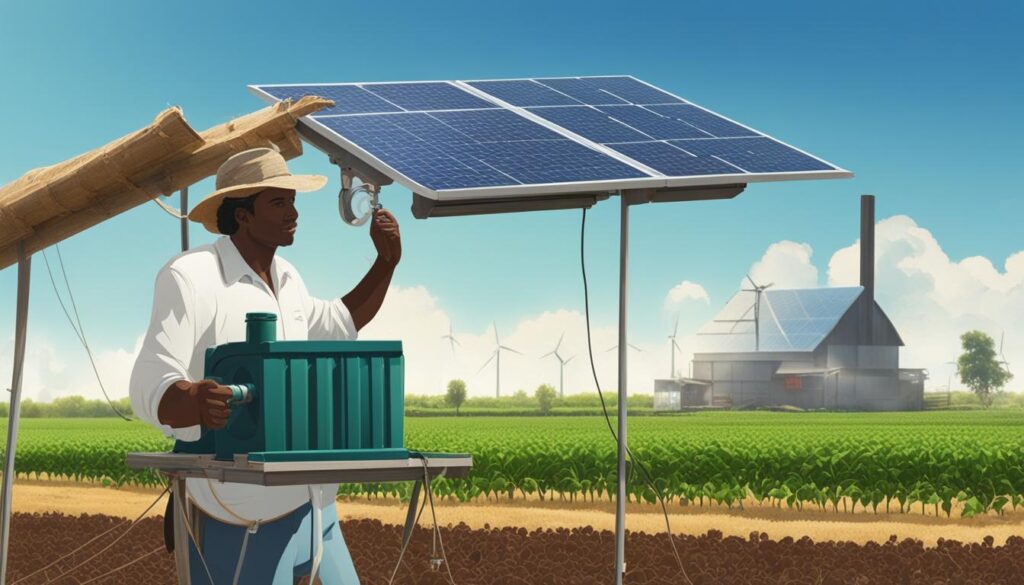Solar water pumping is revolutionizing the agriculture ecosystem in India by harnessing the power of the sun to meet the irrigation needs of farmers. The Solar Pump Yojana, also known as the PM Kusum Scheme, is a government initiative that promotes the adoption of solar-powered water pumps in the agricultural sector. This renewable energy program aims to reduce environmental impact, increase income sources, and contribute to India’s sustainable development goals.
Key Takeaways:
- The PM Kusum Scheme is a government subsidy program that encourages the installation of solar water pumps in agriculture.
- Solar water pumps are environmentally friendly, cost-effective, and require minimal maintenance.
- They can be installed in remote areas, offering scalability and versatility.
- Under the scheme, farmers receive financial assistance through subsidies and loans for installing solar pumps.
- Solar water pumping contributes to sustainable agriculture, reduces reliance on electricity and diesel, and supports India’s renewable energy goals.
Types of Solar Water Pumps
Solar water pumps play a crucial role in harnessing clean and renewable energy for various applications, including irrigation, livestock watering, and providing clean drinking water to communities. These pumps come in different types, each designed to meet specific water requirements. Let’s explore two common types of solar water pumps: solar submersible pumps and solar surface pumps.
Solar Submersible Pumps
Solar submersible pumps are ideal for lifting water from deep underground sources, typically depths exceeding 15 meters. These pumps are designed to withstand submersion, making them suitable for wells, boreholes, and other water sources below the ground surface.
Solar Surface Pumps
Solar surface pumps, on the other hand, are smaller in size and are capable of raising water from shallow sources, such as streams, storage tanks, and shallow wells. These pumps are compact, efficient, and perfect for water sources that are only a few inches deep.

Regardless of the type, solar water pumps offer numerous advantages. They reduce the reliance on traditional energy sources, minimize carbon emissions, and provide a sustainable solution for water pumping needs. Furthermore, solar water pumps require minimal maintenance, making them a cost-effective and low-maintenance option for rural areas and remote locations.
Applications and Installation
Now, let’s explore some of the applications where solar water pumps can be utilized:
- Irrigation: Solar water pumps can be used to efficiently irrigate agricultural fields, ensuring optimal water supply for crop growth.
- Livestock Watering: By harnessing solar energy, farmers can use solar water pumps to provide clean and accessible water for their livestock, improving animal health and productivity.
- Community Water Supply: Solar water pumps can be employed to supply clean drinking water to rural communities, promoting better health and well-being.
Installing solar water pumps is a straightforward process and can be done in various water sources. Whether it’s a stream, storage tank, shallow well, or pond, solar water pumps offer flexibility and ease of installation.
In the next section, we will delve into the details of the PM Kusum Scheme, a government initiative that provides financial assistance and subsidies for solar pump installation projects.
PM Kusum Scheme: Empowering Farmers with Solar Pumps
The PM Kusum Scheme, introduced by the Ministry of New and Renewable Energy, aims to promote renewable energy in the agricultural sector. This scheme offers a significant opportunity for farmers to embrace clean energy solutions and mitigate the challenges associated with traditional farming practices.
The PM Kusum Scheme consists of three key components: decentralized grid-connected power plants, standalone solar agriculture pumps, and solarizing grid-connected agriculture pumps. These components work together to provide a comprehensive solution for farmers to harness solar energy for their water pumping needs.
Under the PM Kusum Scheme, farmers can receive financial assistance for installing solar pumps. The scheme offers a 30% subsidy from the central government, a 30% subsidy from the state government, and the remaining 30% as a loan from the state government. This financial support aims to make the installation process more accessible and affordable for farmers.
To participate in the scheme, farmers need to register at the India.gov.in portal and meet the eligibility criteria. This includes owning agricultural land and having a valid bank account. By following the solar pump subsidy guidelines, farmers can navigate the installation process and avail the benefits offered by the PM Kusum Scheme.
The PM Kusum Scheme provides significant advantages to farmers. Firstly, it paves the way for a steady cash flow through the sale of excess electricity generated by the solar pumps. This additional income source can contribute to the overall economic stability of farmers and their families.
Furthermore, the scheme encourages the utilization of barren land for solar pump installations. By making effective use of previously unproductive land, farmers can maximize their agricultural potential and increase their overall productivity.
Lastly, the PM Kusum Scheme eliminates the reliance on diesel pumps, reducing both the financial burden and the environmental impact associated with their usage. Solar pumps offer a clean and sustainable alternative that aligns with India’s renewable energy goals.
By empowering farmers with solar pumps, the PM Kusum Scheme promotes the adoption of renewable energy in the agricultural sector. This initiative not only reduces fossil fuel dependency but also contributes to the sustainable development of rural communities, creating a brighter and greener future for farmers across India.
Conclusion
The Solar Pump Yojana, also known as the PM Kusum Scheme, is a groundbreaking initiative that harnesses the power of clean and sustainable energy to empower farmers and drive rural development in India. By adopting solar water pumps, farmers can reap numerous benefits that positively impact their livelihoods and the environment.
One of the key advantages of the scheme is the reduction in energy costs. Solar water pumps eliminate the need for expensive electricity or diesel, providing farmers with a cost-effective solution for irrigating their fields. This not only increases their income potential but also ensures the long-term sustainability of their agricultural practices.
Moreover, the PM Kusum Scheme offers financial assistance in the form of subsidies and loans to facilitate the installation of solar pumps. This support makes renewable energy more accessible to farmers across the country, enabling them to transition towards sustainable agriculture practices.
By reducing reliance on subsidized electricity and fossil fuel-powered pumps, solar water pumping plays a vital role in promoting sustainable agriculture. It minimizes carbon emissions and environmental degradation, while also improving irrigation efficiency and water management.
The PM Kusum Scheme aligns with India’s vision of achieving 500GW of renewable energy by 2030 and showcases the government’s commitment to promoting clean and green energy sources in the agricultural sector. Through this initiative, the benefits of solar pump yojana extend beyond individual farmers, contributing to rural development and a greener future for India.
FAQ
What is the Solar Pump Yojana?
The Solar Pump Yojana, also known as the PM Kusum Scheme, is a government initiative aimed at promoting the adoption of solar-powered water pumps in the agricultural sector. The scheme provides financial assistance and subsidies to farmers for installing solar pumps, reducing their reliance on conventional energy sources.
What are the benefits of the Solar Pump Yojana?
The Solar Pump Yojana offers a range of benefits to farmers. These include reduced energy costs, the opportunity to generate income from excess electricity through net metering, the utilization of barren land for solar installations, and the elimination of diesel pumps, which are not only costly but also harmful to the environment.
What are the types of solar water pumps available?
There are two main types of solar water pumps: solar submersible pumps and solar surface pumps. Solar submersible pumps are used to lift water from deep underground, typically depths of over 15 meters. On the other hand, solar surface pumps are smaller in size and have enough power to raise water that is only a few inches deep.
How can farmers avail financial assistance for solar pump installation?
Farmers can avail financial assistance for installing solar pumps through the PM Kusum Scheme. Under this scheme, farmers can benefit from a 30% subsidy from the central government and a 30% subsidy from the state government. The remaining 30% can be obtained as a loan from the state government. Farmers need to register at the India.gov.in portal and meet the eligibility criteria to avail of this financial assistance.
How does solar water pumping contribute to sustainable agriculture?
Solar water pumping reduces farmers’ dependency on subsidized electricity and diesel pumps, leading to more efficient and cost-effective irrigation processes. By harnessing clean and renewable energy, farmers can decrease their environmental impact and reduce carbon emissions. Solar water pumping plays a vital role in promoting sustainable agriculture and contributing to India’s renewable energy goals.
How does the PM Kusum Scheme contribute to India’s renewable energy goals?
The PM Kusum Scheme aims to promote renewable energy in the agricultural sector and support India’s mission of achieving 500GW of renewable energy capacity by 2030. By incentivizing the adoption of solar pumps, the scheme reduces fossil fuel dependency, promotes sustainability, and contributes to the country’s overall renewable energy targets.

